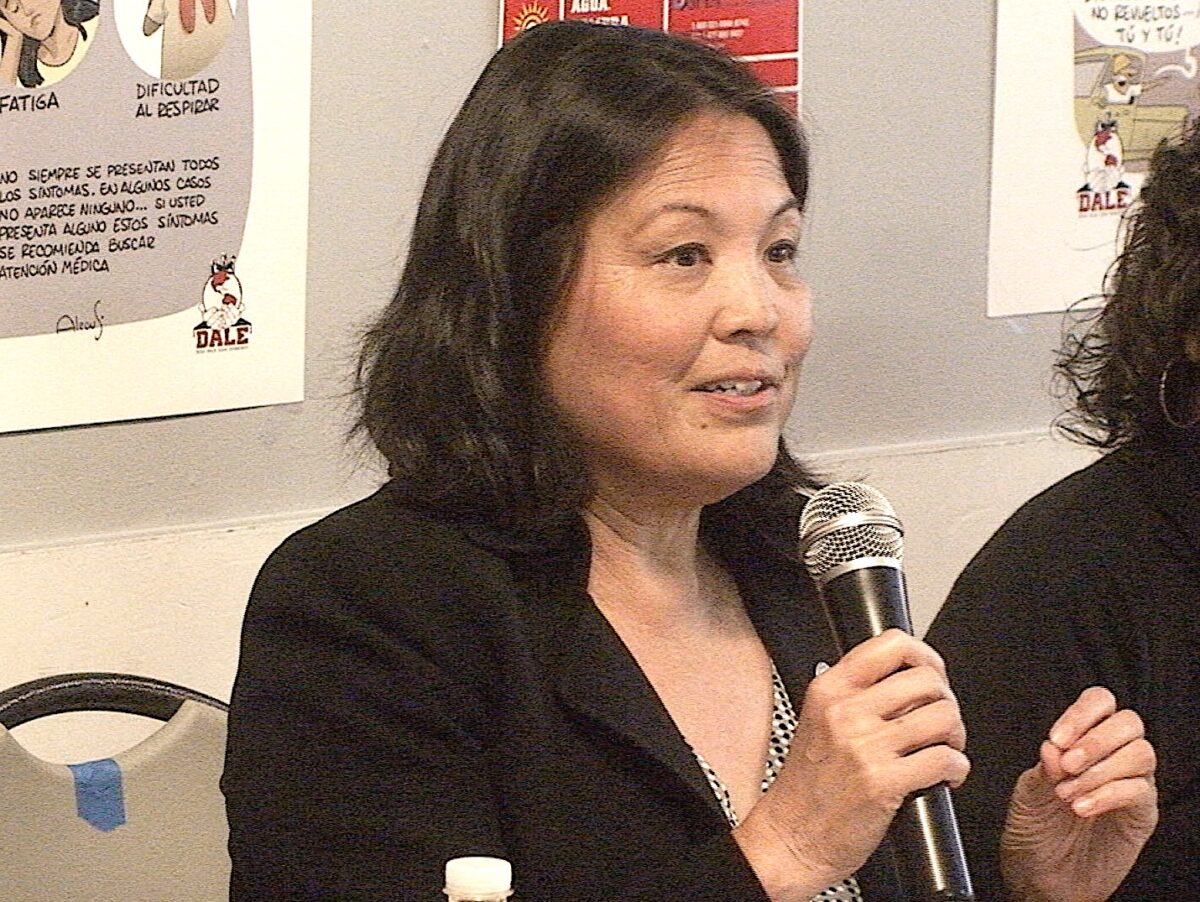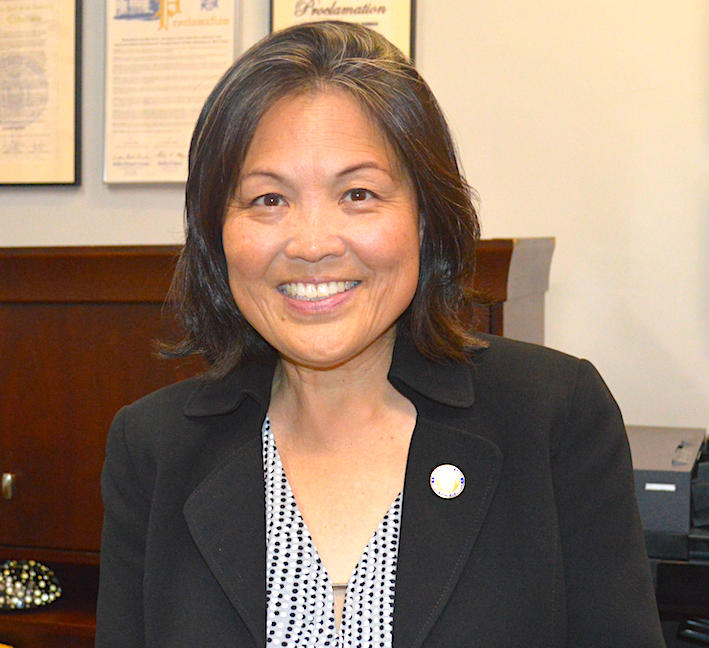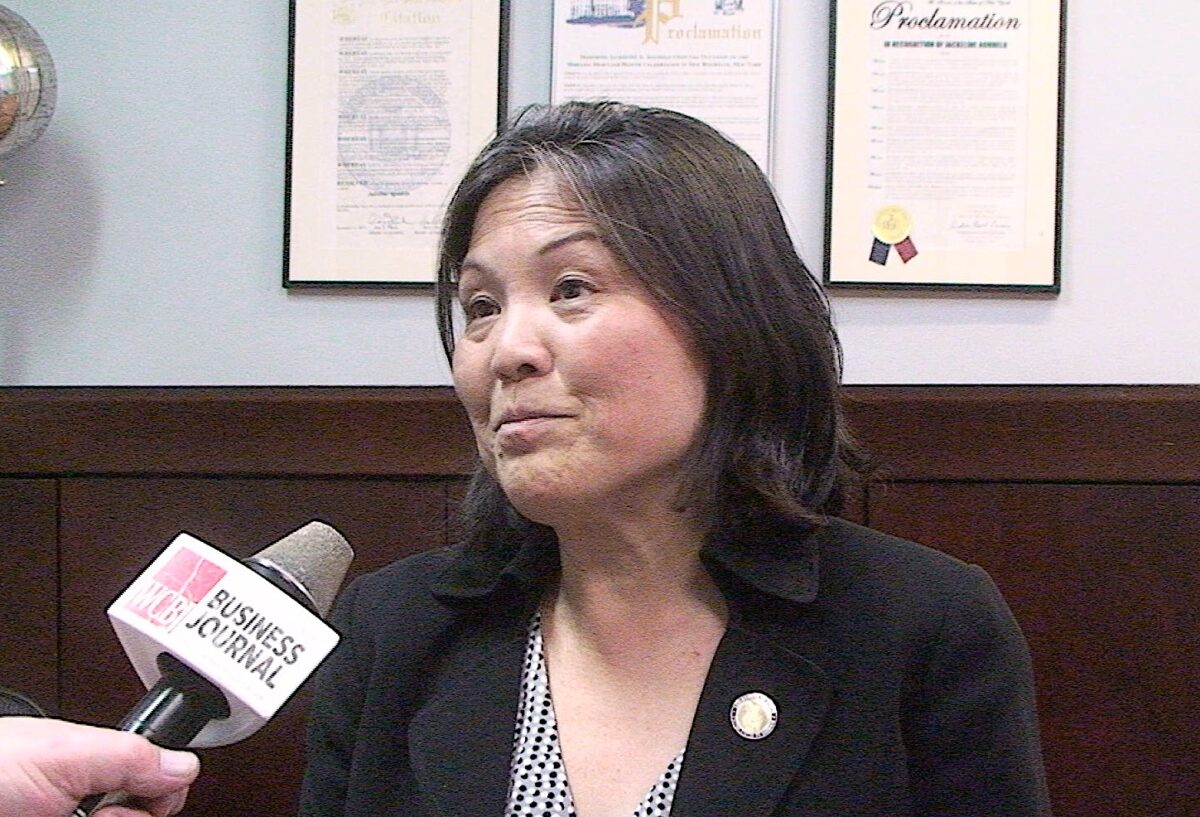“When workers stand up and speak out and fight they deserve somebody who champions that and I said when the president nominated me that to all workers toiling in the shadows, I see you, I stand with you, I fight with you and I’ll continue to do that as long as I’m in this position,” Acting U.S. Secretary of Labor Julie Su told the Business Journal in a one-on-one interview Oct. 10.
Just three days later, on Oct. 13, Su was praised by President Biden for her work in helping resolve a strike by workers at health care giant Kaiser Permanente.
“I’m also grateful for the role Acting Labor Secretary Julie Su played in bringing these parties together,” Biden said. “This isn’t the first time Acting Secretary Su has helped essential workers and their employers reach an agreement. She continues to play an integral role helping my administration and workers across this country build an economy that works for everyone.”
Su was visiting New Rochelle to meet with workers served by the National Day Laborer Organizing Network and other organizations for a roundtable discussion on worker safety and health that took place at the United Community Center of Westchester. The fact that some of the workers in attendance primarily spoke Spanish was not an issue for Su, who is fluent in the language. With her were representatives of the Occupational Safety and Health Administration (OSHA) to explain what the agency does to investigate complaints of unsafe or unhealthy working conditions.

“It’s great to listen to the experiences of workers, health and safety violations that take place on a regular basis, wage theft that they endure and the ways that workers are organizing to demand safer and better working conditions and what we can do as a department to assist them,” Su said. “This president (Joe Biden) has been very clear that he intends to be the most pro-worker president in history. That means coming to where workers are, hearing about their experiences, hearing about their struggles and making sure that we are hearing, seeing and serving the most vulnerable workers in the economy.”
On Feb. 28 of this year, President Biden announced his nomination of Su as Secretary of Labor.
“Julie is a tested and experienced leader, who will continue to build a stronger, more resilient, and more inclusive economy that provides Americans a fair return for their work and an equal chance to get ahead,” Biden said.
Opposition to the nomination came from Republicans in the Senate as well as Sens. Joe Manchin and Krysten Sinema and that opposition has held up her confirmation. Su has been serving as “acting” secretary, which does not require Senate confirmation. She said the lack of confirmation has not impacted her ability to function on the job and has not affected operation of the department.
“I have tremendous respect for the Senate and obviously for that process and I’m grateful for the support I’ve had from many senators,” Sue said. “We will continue to hope for a confirmation but at the same time working people in this country need a strong Labor Secretary to do the job and that’s what I’m here to do.”
Su’s visit to New Rochelle was part of a two-day trip to the New York area, where on Oct. 11 she spoke in Manhattan at the dedication of the Triangle Fire Memorial. On March 25, 1911, 146 workers were killed in a fire at the Triangle Shirtwaist Factory at the Asch Building (now the Brown Building) on Washington Place, just east of Washington Square Park. Investigation exposed the deplorable working conditions at the factory that included workers being locked in with no safe means to escape once the fire broke out. The fire led to a nationwide effort to improve working conditions.
“Every worker who goes to work in the morning should know that they’re going to come home safe at the end of the day,” Su said. “Every single worker deserves a just day’s pay for a hard day’s work and I think that we at the Department of Labor can play a very important role in making sure that it is happening.”
One important function of the department deals not with worker rights, health or safety but with tracking through its Bureau of Labor Statistics what’s happening in the nation’s workforce that impacts the nation’s economy. For example, statistics released Oct. 6 reported that 336,000 jobs were added in September with the unemployment rate unchanged at 3.8%.


“It demonstrates continued job growth in this economy,” Su said. “Since President Biden came to office 13.9 million jobs have been created at the same time that we have record low levels of unemployment. Unemployment has been under 4% for over a year and a half, the longest stretch since the 1960s.”
When asked about recent labor strikes in the U.S. such as by the Untied Auto Workers, the Writers Guild of America, the Screen Actors Guild and employees at Kaiser Permanente, Su noted that sometimes the contract negotiating process breaks down.
“This president has been very clear that he supports unionization and the right of workers to join a union if they wish,” Su said. “Sometimes that process is messy. Sometimes that process is long and part of that process includes the ability of workers to strike when they need to in order to get a fair contract. We think that these are all things that are resulting in stronger, more inclusive conditions for working people across the country. That’s part of the reason I’m here in New Rochelle; to hear from workers that are continuing to fight for that.”


Su was asked about the recent move by the administration to make it easier for about 472,000 migrants from Venezuela to obtain Temporary Protected Status that will allow them to legally work in the U.S.
“We want to be very clear that no worker checks their humanity at the border,” Su said. “Every worker has rights regardless of their immigration status and immigration should not be weaponized against them. It should not be used to sow fear and tell workers that they have to endure whatever illegal practices are thrown at them. Part of the recent effort was to make sure that workers who do have the ability to get work authorization know that they have that. This is part of a broader approach where we believe every worker should know that they have rights and that when they stand up to defend them they can do so free from retaliation.”


















